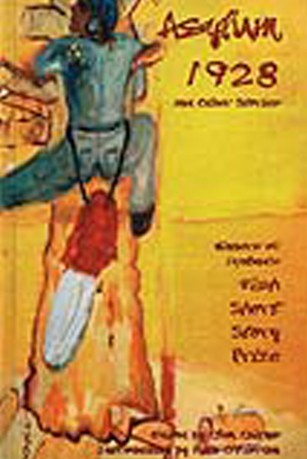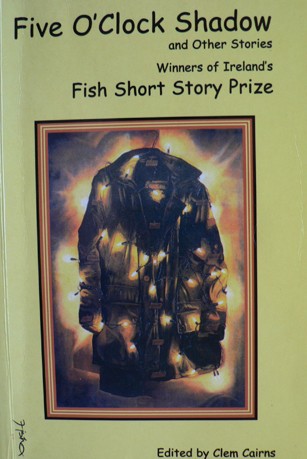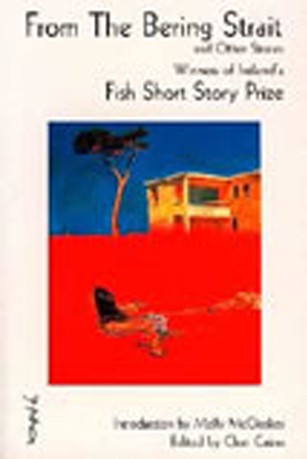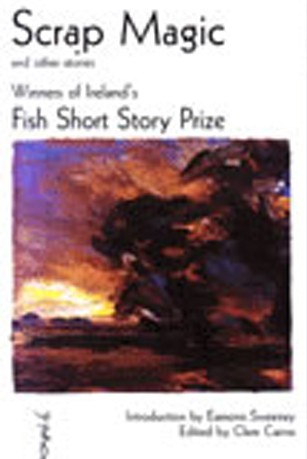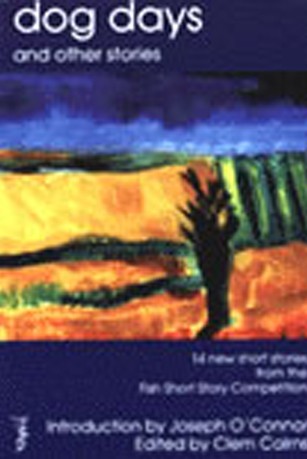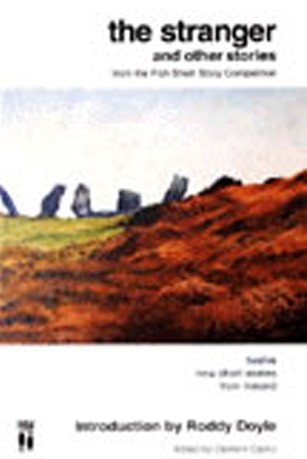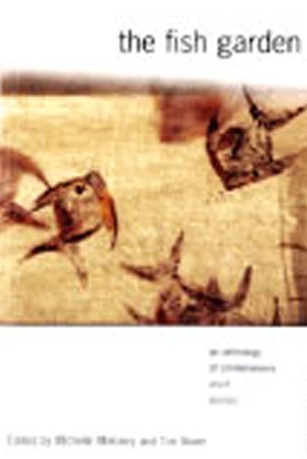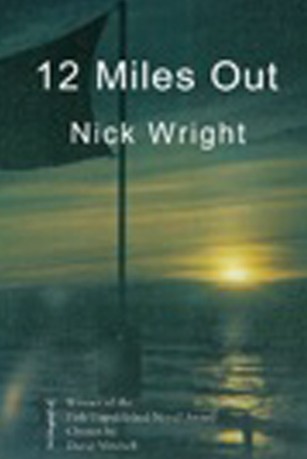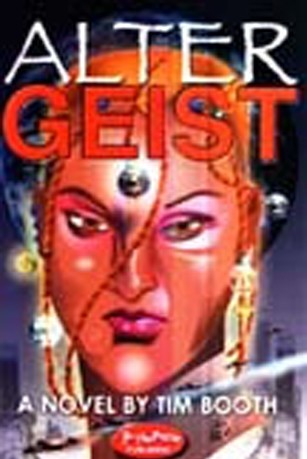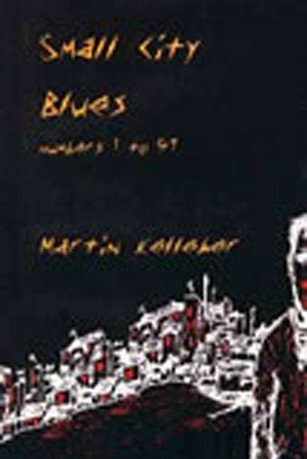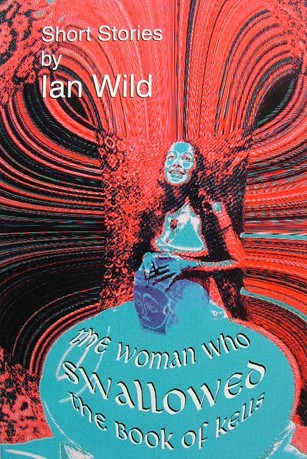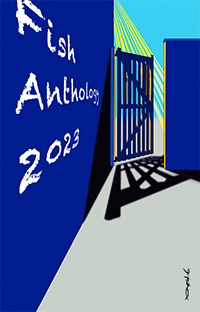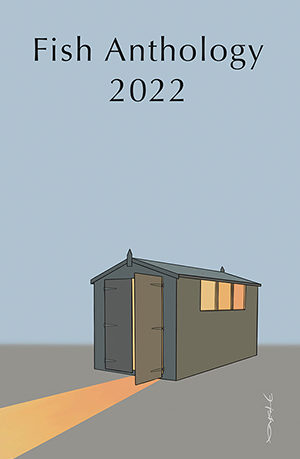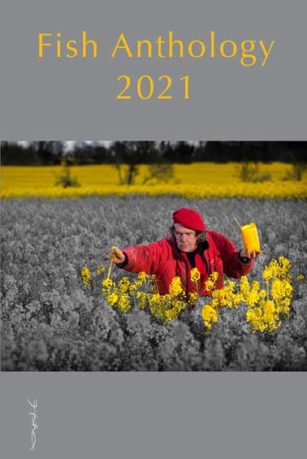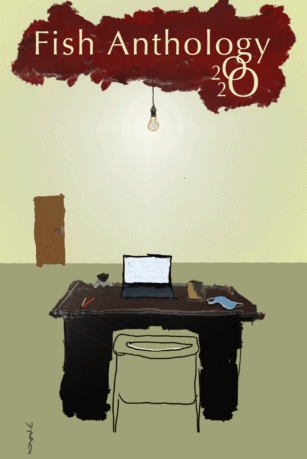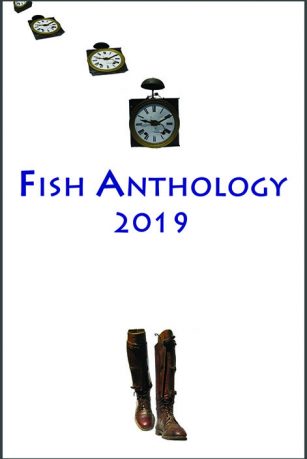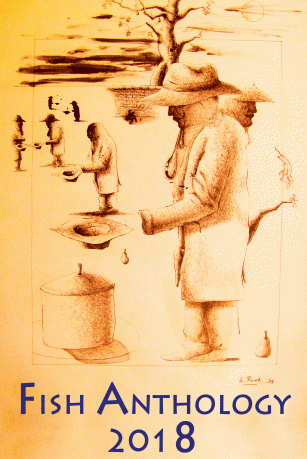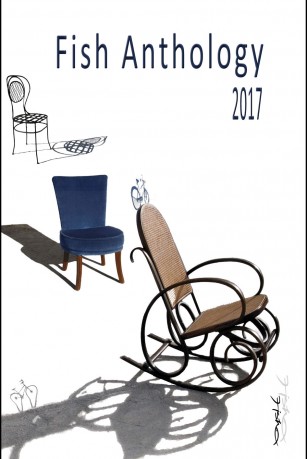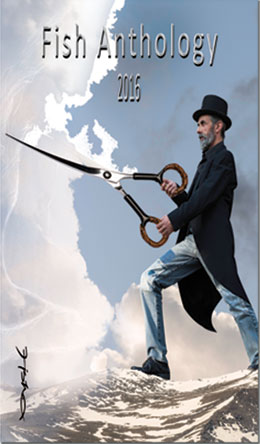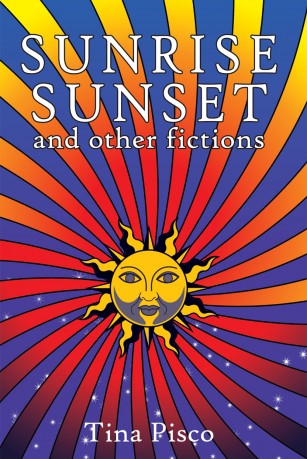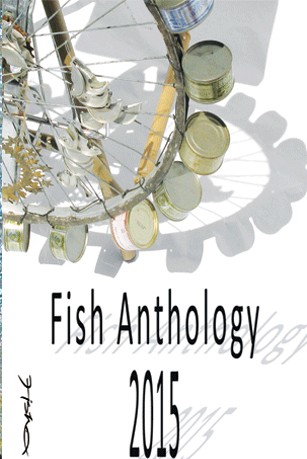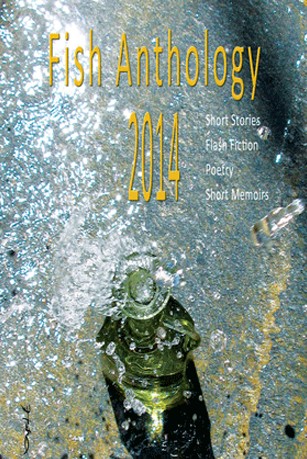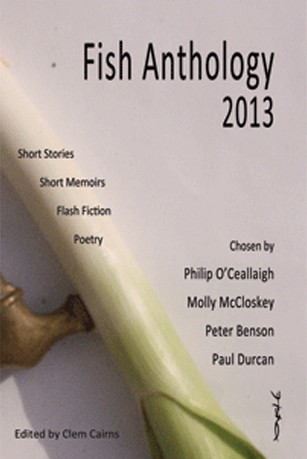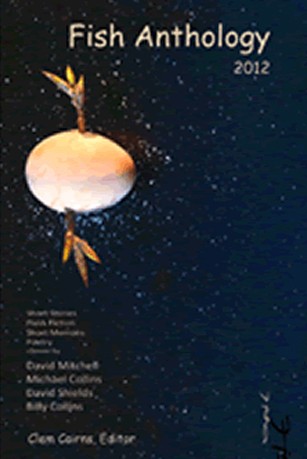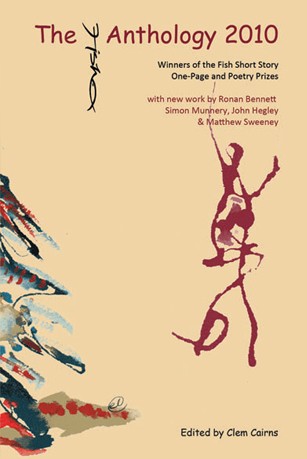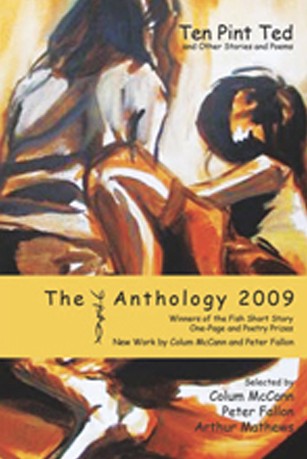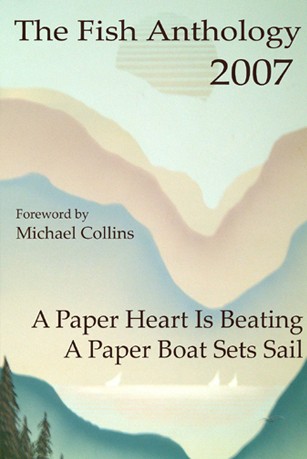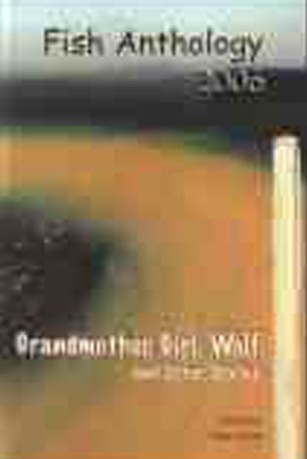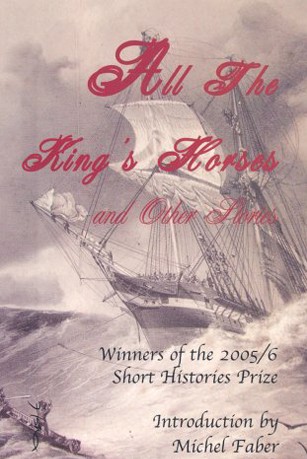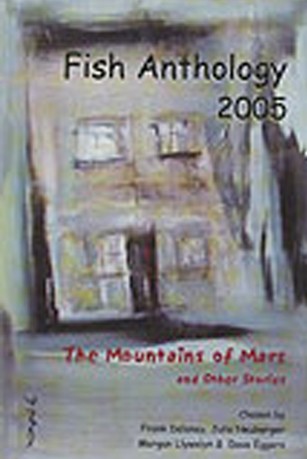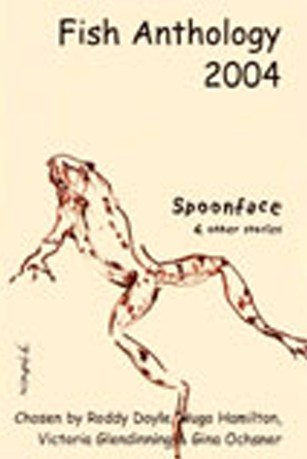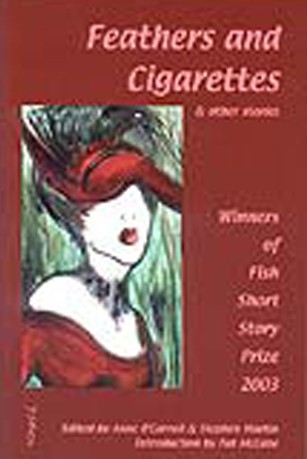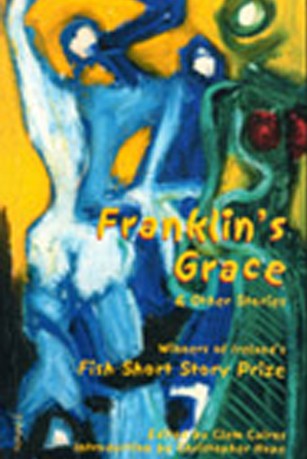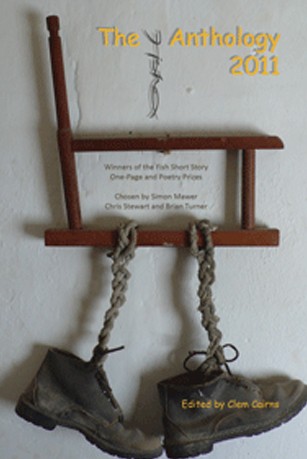
Fish Anthology 2011
ISBN: 978-0-9562721-2-6
This anthology contains the winning stories and poems from Fish Publishing’s three annual competitions – The Fish Short Story Prize, The Fish One-Page Prize and The Fish Poetry Prize. Below you can read the two introductions from this anthology by Simon Mawer and Chris Stewart, and the acknowledgements by editor Clem Cairns. Listed below you will find all authors and poets published in this anthology along with the titles of their work. Read the winning short story – The Space Between Louis and Me by Mary O’Donnell, the winning one-page story The Long Wet Grass by Seamus Scanlon and a poem -Swept Back by Jean Tuomey Introductory Notes Simon Mawer On Judging the Fish Short Story Competition, 2010/2011 Short story writing is a bit like painting in water colours. It’s an art of precise strokes in which you need to be deft, accurate and sensitive to the faintest imbalance. And if it’s good then the finished whole is somehow more than the sum of its parts. On the other hand, novel writing is more like painting in oils. You can layer, rework, scrub things out, move near, stand back, live with the thing in your studio for a year or more, counterbalance a lapse here with a successful passage there. And all too often the whole is somehow less than its various parts. As a writer I feel I can do the oil painting, more or less; it’s the water colours that make me feel inadequate. So it was with some trepidation that I received the final twenty stories that had made the cut in the Fish Short Story competition this year. No committee decision from now on: it was up to me alone. Aside from being a novelist I have also been a teacher – not of English or Creative Writing but of workaday Biology – and as soon as I turned to the first story I found the teacher in me asking questions: what are the criteria? where is the mark scheme? how can you be objective about this? The answer is, of course, you cannot. Assuming all the stories are competently written (they were) any further judgement must be purely subjective. So, feeling guilty, I threw years of pedagogical conditioning out of the window and sat down to read. I wasn’t a teacher marking exams, I was a writer doing the impossible: trying to rank works of art. And the only way I could do it was by deciding which of these stories I liked best. What struck me forcibly was the preponderance of family anguish stories. Isn’t this theme a trifle hackneyed? Perhaps it comes from that injunction of the Creative Writing course, that you should write about what you know. I’d say, write about what you imagine. Let your imagination take you to places and inside people whom you couldn’t possibly otherwise have known. Imagination is the key, the crux, the hinge on which all art turns. So I was captivated by the desolate mining world evoked in Big Spirit Blow with its awful shrivelled corpses and the bewildered Ozzies trying to make out what was going on. And the biologist in me loved the gruesome mutated Cordyceps fungus attacking humans as the current species attack insects. The tone is right, the language is right, threat is expertly hinted at. You breathe in the spores as you read. Closer to home, La Paix seemed a beautifully oblique portrait of a marriage broken by a single, mundane tragedy – half a lifetime distilled into a few thousand words, emotions alluded to rather than stated bluntly. I enjoyed the bleak detachment of the narration and the bitter irony of “insurance”, which is the leitmotiv of the story. Finally my winner was The Space Between Louis and Me, for its humour and its gentle mockery of our current obsession with the virtual world. With social networks and online gaming replacing human interaction, who can doubt that someone like Louis, or Louisa, is waiting just round the corner for you? Yet beneath the veneer of humour was a real evocation of the isolation that imbues so much of modern life. And, as with a fine water colour, this piece was created with minimal brushstrokes. So that’s my verdict. And why do I still feel guilty? It’s the damn teacher in me again, having awarded marks and then thinking, “Have I got it right?” as though there is some absolute rightness against which we will all eventually be judged … Simon Mawer Rome March 2011 Introductory Notes by Chris Stewart It’s depressing … and that’s a word you should never start a piece with … but there it is; all that teeming talent out there that goes unmentioned; the hopes that hang on these reams of literary effort, and the crazy dreams too. They said it to JK Rowlings, and they would have cautioned Stig Larsson if he’d still been around: ‘You won’t be silly enough, dear, to imagine that sales from your work will cover the cost of your season ticket, will you.’ So to all those dreamers and storytellers who didn’t even get a mention, don’t worry, keep on dreaming and hoping; you’ll get there in the end – wherever ‘there’ is. The thing is to keep at it, doing and living, talking and listening, and reading … and writing about it. Nobody ever became a writer without writing, and, although I hesitate to fall back upon such a time worn expression in the context of a literary competition, ‘All work and no play makes Jack a dull boy’, so take a little time off to go and look at things and, for want of a better expression, do stuff. Reading the one page stories I was a little dazzled, and, inevitably, disappointed that I couldn’t give the prize to everybody. Probably the only candidate not to deserve a prize would have been me, for I was asked if I’d like to have a crack at it … I wouldn’t have dared though. It’s just too tight a format: you’ve got to be really slick with the one-pager; every word must count, every punctuation mark. Me I’m more of a rambler; discursive is what I do. It’s a cheap trick to hide one’s essential ignorance beneath a cloud of verbiage and waffle, but it gets me by; it gets me by. And so to the mentions: ‘The Priest’ was convincing, deft character building with a few light brush strokes of language, darkly witty and horrible and given depth by the little details. I loved ‘The Third Ring’, a richly individual take on the old ‘Big John’ theme. ‘Motherly Instinct’ is right up there with the best, some deliciously complex characterisation in so few words, and a well handled build-up to the sinister dénouement. ‘Hey Jude’ gradually worked its way into my affection – it escaped me on first reading, but that’s my fault – it’s witty and fun. It’s hard to sustain these speech patterns, but here it’s skilfully carried off. ‘Passing Over Paradise’ is pleasingly constructed, a satisfyingly artful conceit. And the beautiful ‘Satin Pumps’, a delicately painted love story, made me smile with pleasure. ‘Stargazey’ was my third choice. I was drawn deeply into the tale and felt the warmest affection for the unfortunate protagonist. God knows how you pull that one off in so few words … but it works. It’s a richly woven tale of love, violence and pathos, miraculously couched in vernacular language. ‘Let There Be Light’ made me laugh with delight, and it came in at number two. Strong writing in the service of a thoughtful bit of fun … don’t ever knock the fun; its place in the literary fold is often underestimated. I like the bloke (was it a bloke?) who wrote this; I felt it was an author I could enjoy a jar or two with. (Later I discover the author’s name is Allison.) I read ‘The Long Wet Grass’ first … and I thought ‘Oh no, I hope they’re not all as good as this.’ Well they were good, but not this good. It’s a masterly bit of story telling, just about flawless. It does everything a good story should do: it sets the atmosphere and draws you in, and then tears you limb from limb. It is achieved utterly convincingly … and don’t ask me how it’s done; it’s just too good for that sort of analysis. I still can’t get it out of my mind. Thus the Fish Prize, its honourable mentions and the wonderful winning pieces. Inspired by what I’ve read, I’ve a mind to pluck up the courage and have a crack at it myself. The one page story is perhaps not the most obvious way to make a living; I imagine the financial rewards are meagre. But it’s a good exercise, and from the feeling I get from what I’ve read, I imagine it’s a lot of fun. And I think I said somewhere before: ‘Never knock the fun.’ Chris Stewart Spain May 2011 Editor’s Note and Acknowledgements from Clem Cairns Whenever a collection comes together, there is work left out, weeded out in the selection process. In the case of the Fish Anthology that is a lot of work, and a lot of that would have been just fine were it included. The testaments from the judges will reinforce that. So many entries to the three Fish Prizes were good enough to be included in this book that it makes us all at Fish sweat and lose sleep. So a word of encouragement to all writers who made the longlists – we enjoyed your stories and poems, keep writing, keep the faith, and thank you for entering and helping to make it possible to publish the lucky ones. The Fish editorial staff – Mary-Jane Holmes, Mary Hawkes, Max Brooker, Pauline Lloyd, Afric McGlinchy, Tina Pisco, Conrad Hart, Tessa Gibson, Judith Hinman, Rita Ellliott, Jemma Murat, Nicholas McLachlan, Sasha de Buyl Pisco, Brenda Berck, Jayavity Baines, Kim Henry – read the stories and poems, selecting the longlist that was further distilled to a short one and sent to the judges. Thanks to them for their attention, their hours of reading and discussing, the results they produced. Simon Mawer judged the Short Story Prize, Chris Stewart the One-Page, and Brian Turner the Poetry. They are all writers at the height of their powers, busy and in demand, and I am especially grateful to them for selecting the winners from the shortlists. Their presence added greatly to the interest and excitement of the competitions, and it is a great boost for the writers in this book to have been selected by one of these authors who have excelled at their craft. Thanks to Max Brooker for proofing, to Mary-Jane Holmes for the months of work with the students on the Fish Flash Fiction Online Writing Course, which produced some wonderful work and many contented students with improved writing skills. Clem Cairns, Durrus 2011
Contents
AUTHORS
The Space Between Louis and Me
Mary O’Donnell
La Paix
Hannah-Fleur Fitz-Gibbon
Big Spirit Blow
Robert Porteous
Bread and Stone
Sylvia Torti
The Yellow Cardigan
Vicky Woodcraft
The Blue Notes
Jenni Lawson
You only know who your Mother is
Kelly Holman
Off My Trolley
Jude Bridge
Casting for Parts
Caroline Greene
Daddy’s Rich and Mummy’s Good-Looking
Jo Campbell
ONE-PAGE STORIES
Seamus Scanlon
Let There Be Light
Allison Fletcher
Stargazey
Simon Poole
Satin Pumps
Joanna Bury
Passing Over Paradise
Richard Bond
The Third Ring
Richard Scarsbrook
Hey Jude
John Mulligan
Motherly Instinct
Margie Wilson
Priest
Marie Altzinger
Cover
Jette-Julie A. Rosendal
POETRY
string theory
Ken Taylor
Jean Tuomey
The Kwai to Myanmar
Stephanie Scott
Continuum
Diana Adams
The Fall
Kita Shantiris
This Morning
Michael McCarthy
Crates
Jo Bell
Mama Kettle
Cecile Callan
Practical Advice to the Poet
Malissa Priebe
Turning
Kirsty McCormack
The Space Between Louis and Me by Mary O’Donnell I think of Louis as a decorative essential. He doesn’t do much around the place beyond being there as much as I want. He doesn’t cook or clean up and can’t make a bed to save his life. I watch in frustration as he goes through the motions of holding a book, knowing reading is beyond him. Yet guided by me, conversation is lucid. He is by no means stupid. Most mornings I’m alone again. He has slipped away although he’s with me until sleep falls through the dizzy mire of my semi-aroused thoughts. Nights are dreamless places where I wallow in oblivion. When I open my eyes, unrefreshed, occasional sunshine hacks through the window-blind, or I hear the swat of a wet westerly on the glass. I am persistently exhausted, though often happy. At the clinic, a few male colleagues share my secret. The exhausted, prematurely wrinkled bags beneath eyes, and that five o’clock unshaven look at nine a.m. arouse my curiosity. As if they can’t be bothered keeping up appearances with basic grooming that, until recently, drove this city to a crescendo of open nail-bars, high-end barber-shops and massage parlours. In general, my women colleagues are discreet. There’s no knowing who or what is observed across desks and filing cabinets as we prepare for another day of group-work, as we assemble files, then check our pockets for antacid supplies: Bisodol and Gaviscon. Birchwood, as the clinic is called, is littered with divorcee social-workers and therapists on the move, shaking themselves free of past lives, attempting reincarnation. Such hurry! Yet apart from the usual sour clichés about that sad fuckand I’ll see him in court again or even bastard needn’t think he’s having the children all summer, there isn’t much talk about what’s happening now. In a way, they are as private as me, too burdened, between caseloads and new admissions, the constant stream of alcoholics, gamblers and narcotics abusers housed beneath the clinic’s ill-repaired roof, to think. I’ve gleaned from the whispering gallery of the coffee-queue though, that some have quick flings. Others date more cautiously. One or two discovered they were lesbians and are in that vivid state of fresh exploration usually found with first love. At lunchtime, while the addicts enjoy an energy-optimising lunch, I sometimes walk along the estuary, past gleaming, award-winning bridges, beyond the disused gantry and the giant upside-down question-mark of an orange hook that dangles in the gap between the struts. The air is briny. Blindfolded, you’d think you were on a daytrip to the seaside, but eyes wide open this river is moily, pouring itself like green ink into Dublin Bay. Gulls scream around the few docked ships, metal screeches and groans at a nearby foundry. There’s no chance I’d run into Louis. Impossible, in fact. Boastful though it sounds, his very existence depends on me. I once observed someone else in the same situation as myself. Near the train station, a man, who might have been on his way back to an office, hung around beneath the huge round clock as passengers streamed in and out. At two minutes past two in the afternoon, there he was beneath the black Roman numerals, chatting to himself. The average passer-by might assume he was speaking into a discreet mouthpiece, or that he belonged to the scattering of walking, talking mad who traverse the city. But it was more than that. He adjusted his spectacles, then a tiny ear-piece. Anyone would assume he was near-sighted and slightly deaf. Working with addicts fucks up the most balanced disposition, although that’s not my excuse. The Serenity Prayer isn’t all it’s cracked up to be either. Some convince themselves work is the key. They become top sales people or even middling sales people, or they build credits doing self-improvement courses. Others, like me, travel as often as they can manage it. I’m entitled to seven weeks’ holidays plus a week sick leave. Not bad. I once committed myself to evening car maintenance, became quite chummy with the under-the-bonnet fumblers, all male, then gave up. Useful as it is to understand the workings of the average car engine, points and plugs didn’t really sail my boat. Then came wine tasting, sausage making, and a series of art history lectures. All sublimation, the lot of it. As I can’t spend my entire life with Louis, work at the clinic fills time between breakfast and evening. It pays the bills. Coffee’s good too. I achieve some successes with the depraved and broken, am acknowledged to be kick-ass but not cruel. The only thing that riles me is when Significant Others won’t let go, make excuses, slipping bottles of gin and pick-me-ups that interfere with the work. As a result, I’ve deleted my share of abusive e-mails. Once or twice on the phone, I’ve had to cut off the parent of some pasta-faced heroin daughter or son in mid-rant. An upset, alcoholic pregnant woman once screamed herself hoarse in group, the child she was carrying already a pickled walnut. This is abnormal, but in the circumstances, also normal. But a heavy caseload doesn’t mean I don’t read and write. Call me an artistmanqué, I know how to look, how to look again, how to re-read. I have drawers filled with notebooks bought in galleries around the world. Snap-shut magnetic covers, embroidered covers, lined, unlined, Moleskine, Chinese, Quaderno, wood-pulp, school jotters, filled with wandering words from the bird in my chest. My yellow-bricked apartment overlooking the canal is sanctuary to bird-words, to many necessary fripperies trawled home from the world beyond our island. It satisfies me to wear a moonstone ring and imagine it was given to me, that Louis gave it to me when in fact this would be impossible, because he has no money, no currency. It excites me to warm a chained oblong of tiger’s eye in my hand before draping it on my breast-bone, the chill gone. I imagine his honey-coloured hand warming it, not mine. Sometimes too, I dance before him, in the bedroom, enveloped in a Rose Madder length of silk from the province of Uttar Pradesh. In India, I managed without Louis. I made a pact with myself for strength in the face of temptation. In fairness, he did not ask to come. Before I left, I enquired casually if he would miss me. Of course I’ll miss you, he replied with annoying equanimity. But self-control is his middle name. This is how he came to me. Poised, quietly confident but capable of submission to my will, my harmless needs. A woman couldn’t ask for more. How much will you miss me, I pressed. He turned with a radiant smile and answered with open arms. I will miss you to the floors of the ocean and the roof of the sky. Poetic, eh? I continued packing T-shirts and linen trousers. I’ll see you when I get back, I told him. That’s fine Molly. I’ll be waiting. I am all yours. Not what I was used to hearing from men. Despite myself, I looked up and gazed adoringly at him. He is beautiful, from the Semitic tumble of brown curls on his golden neck, to the wide-set blue eyes. I wanted to bite the generous sculpt of his mouth, to softly press teeth close to blood! One thing I’ve learned in the long, heated therapy sessions, is that women living with men find it all a bit conditional. There’s a great deal of sheet, jeans and towel folding at weekends, toilet-cleaning, and then swanky couples meals to be prepared. The middle-classes can hold their own anytime when it comes to contributing to national addiction stats. Especially at Birchwood. No doubt the chaps feel the same. Resentful and obliged. I could never have married. When I was a child, our farm fed eleven of us. But the barrage of cousins, aunts, uncles, the annual births, the smell of plastic mugs, the metal buckets of steeping nappies conveyed a message to me. It was carried by a bird that dived into my chest like a kingfisher into a pool, one night as I leaned out over the window-ledge at the age of thirteen, listening to a cow lowing in the byre, smelling the cold manurey air, thinking that if I could fly in a straight line over the hills, I’d be in America, and would end up in Los Angeles, where the real stars glowed. I absorbed the bird-message, heard the high-pitched whistle of Never! Never! That feathered little creature has never deserted me. I imagine a small, Byzantine bird not from the world of nature at all, but art. Now I am fifty and feel the downturn of my life, the change that comes when you know the high days have passed but the cleated warmth of the afternoon is yet to be absorbed. Now I really need art. The only one who understood how I felt was Roza. I’m proud of her, the abstract painter whose husband pushed her to sign in for six weeks’ detox. She arrived into the group – puffy-skinned and sullen – but gradually open. She was able to utter the words and mean them, the flaky sentence every stand-up comedian jokes about. ‘My name is Roza and I’m an alcoholic.’ Most clients glare into the middle distance and mutter it quickly, but she held my gaze. After detox, she underwent the full programme, then returned home to Cork to try her luck. We stayed in touch, had relieving telephone conversations late at night about our situations. Hers, married and too wealthy for the good of her art. Mine, single and perhaps too comfortable and intolerant for the good of my heart, and I don’t mean cholesterol. Somehow, I never met the right man. Now. I’ve uttered it, that vile, old-fashioned phrase! What’s to do, Roza used to say in despair. There must be something, I’d reply with a sigh from my king-sized bed, smoking weed. By this stage, the professional distance necessitated by her stay at the clinic had long dissolved. Face it girl, she’d reply, we’re up the creek without a paddle, we’re gettin’ old. Her accent made it all seem much more desperate and tragic. Sometimes, I wept with frustration. Life stretched ahead, filled with more art and more travel, with superficial encounters, with the admiring looks of Middle Eastern men, of Indian men, of any men who think a blonde Irishwoman rides for Ireland and I don’t mean horses. In this city, women outnumber men. But young women have the chutzpah, and until recently they had the money to pick and choose, despite the imbalance. We’ve got to do something radical, I suggested. Like what, Roza drawled cynically. Leave it with me, I said. Wicked, she replied. We didn’t communicate for a few weeks. I think Roza had given up, that she had almost decided to live the entente cordiale that was her uninspiring marriage, to imagine some kind of passion for the sake of her art. Being an intensive Sunday newspaper reader turned the situation around. It takes up most of my day, whether in bed, or later in Café Lumière, near the canal bridge where the swans throng. The café door is open regardless of the weather. In winter, I muffle up, newspaper supplements spread, a large coffee steaming to my right. At other tables, couples and young families are out for a lazy breakfast. An Irish fry-up or waffles and honey. Outside, greedy swans close in, frothing on the grassy bank, heads rising and dipping. I perused the Personals page for a few moments before zooming in on something. I spent a good few minutes reading and re-reading. It wasn’t the usual smarty-pants approach (Cobalt blue eyes, bronze hair and a heart of gold, but also nerves of steel! M, 50) that tries too hard (Pineapple seeks cheese with own stick. F, 33) to impress (Reactive lady, 41, seeking generous physics man to 50). Do we ever know what we’re seeing? Can we ever truly touch those closest to us? Interested in experimenting with an exciting new way of seeing the man or woman of your dreams? Want to meet that man or woman? We guarantee you will not be disappointed! See the many testimonies to this exclusive, Innovative Relationship Solution. Box no. 23/01 * I followed it up, and so did Roza. It’s more difficult for her. How often can she have a new lover right there in the house with an observant husband already on her case? Going out can be awkward in her suburb where even the dogs in the street would notice something amiss and go arf-arf! in their best Cork accents. The people at Rel-aid, assessed our requirements. They listened on skype, they observed and they matched. I paid for both of us by credit card. Dissatisfied customers are refunded in full. What arrived by Fed-ex courier more than met my wildest imaginings. Roza had no complaints either, has created a routine that works for her, mostly in her studio, surrounded by acrylics and sand-paper. I had no idea how closely I could observe Louis as I used The Virtual Rel-aidsuperfine goggles and minuscule ear-piece. Every pore of his skin, every small hair behind the shells of his ears, his beautiful neck, his startling golden-brown eyes were real. I programmed him to respond to his name, after a young travel writer I admire. To refer to ‘programming’ is to defile him. But certain basics are required. Louis will age as I age, keeping pace, seeing me as ever-young without actually thinking about it. He can never observe my delicate pink pallor, the gradual dissipation of my once-serene skin, nor the little cloven hoof-print of my cunt within its silvering fleece. And although I can’t say he actually brings me breakfast in bed on a Saturday morning, he does stand by my shoulder when I’ve arranged everything on a tray. The chartreuse-coloured coffee-cup, saucer and plate. Lemon-toast and one croissant. A fill of steaming Java. Vitamin E. Then he moves up the stairs ahead of me as I bear tray to bedroom, always in my field of vision. He must be straight ahead of me, or slightly to the right or left. Once I move ahead, he vanishes. As I eat, he stretches out beside me. He is weightless, languid, like a feather, despite his toned body. It looks as if his limbs are sinking deep beside me on the bed. But when I remove the goggles, the duvet is as smooth as ever, unmarked by the heft of his shoulders and the curve of his bottom. I wish I could introduce him after work, in the wine-bar, where I don’t drink wine, but tonic and cranberry with ice. The goggles aren’t all that different from ordinary spectacles and I don’t look like a fire-fighter or someone entering a nuclear meltdown zone. The controls are subtle. Even so, I recognised them on that man outside the train station. Those in the know – vulnerable, even ashamed – are on nodding terms. At work, a colleague from what we call the Dice Room chats as if he has known me for years. The recession. Gambling gossip. The boss’s latest staff restructuring scramble. Health cut-backs, indigent gamblers. Back to health cut-backs. Louis understands the mathematics of a broken economy. There, there, he says, reaching for my hand (although he’ll never touch it), things will get better darling, Tokyo is improving my love, and the Nasdaq’s on the rise. You’ll feel better tomorrow. What he fails to grasp is that although the economy might improve in a few years, and the paranoic addicted recover, things will not get better between him and me. We are defined by the space between us. We can never, ever, touch. He cannot know that when I lie back, fascinated and wild at the sight of a Pre-select-for-Size erection, imagining his touch as he sits on a canary-yellow linen chair opposite my bed, that I need to believe his lustful and loving endearments, the quiet sibilance of what he enjoys most. But despite my best efforts, I’m doomed to an atheism which cannot blindly accept the myth-like advantages of modern solitude. From the bed, beyond Louis’s head, I see the canal, frowning and purple in the wind, the swans snowy, and a trail of pedestrians hurrying home to their mysterious lives. At such moments, I sometimes remember all eleven of us children in the house on the farm – the rooms in apple greens and tropical sunset reds, painted by our crazy mother, the outhouses kept distempered by our practical father. Eleven was a community. We would kneel during Lent for the Rosary, always together, secretly fooling our way through all those Hail Marys. Then our parents would suddenly forget, opening a bottle of stout or a new novel (or both), switching on the television, and gradually we’d be back to our fairly secular, un-Rosaried domestic habits. Eleven, then. Now I am one. I am not even one of two. I think I love Louis. I permit myself to love the presence of an absence. Provided I keep the goggles on, he’s with me, night and day. But they often slip off in the dreamless night. No amount of strong elastic keeps them on. Come morning, I am alone again. There will always be that space between Louis and me. But the next time I travel, he’s coming too. I will wrap the goggles in a blouse and place them deep in my luggage. He will exclaim at the India I know, will soak up, in his way, the intense blue of the houses of Jodpuhr viewed from Meherangahr Fort, he will fear for the children of Mumbai, and he too will move on, on, always slightly ahead, through the crowds, past the starved cows, pausing as I pause beside a kneeling astrologer in saffron-yellow who will tell my future. The Long Wet Grass by Seamus Scanlon The resonance of tires against the wet road is a mantra, strong and steady. The wipers slough rain away in slow rhythmic arcs into the surrounding blackness. The rain falls slow and steady, then gusting, reminding me of Galway when I was a child where Atlantic winds flung broken fronds of seaweed onto the Prom during high tide. Before the death harmony of Belfast seduced me. The wind keeps trying to tailgate us. But we keep sailing. The slick black asphalt sings on beneath us. We slow and turn onto a dirt road, the clean rhythm now broken, high beams tracing tall reeds edging against the road, moving rhythmically back and forth with the wind. No lights now from oncoming cars. We stop at a clearing. I open the door, the driver looks back at me. The rain on my face is soothing. The pungent petrol fumes comfort me. The moon lies hidden behind black heavy clouds. I unlock the trunk. You can barely stand after lying curled up for hours. After a while you can stand straight. I take the tape from your mouth. You breathe in the fresh air. You breathe in the fumes. You watch me. You don’t beg. You don’t cry. You are brave. I hold your arm and lead you away from the roadway, into a field, away from the car, from the others. The gun in my hand pointed at the ground. I stop. I kiss your cheek. I raise the gun. I shoot you twice high in the temple. The coronas of light anoint you. You fall. The rain rushes to wipe the blood off. I fire shots into the air. The ejected shells skip away. I walk back to the car and leave you there lying in the long wet grass. Swept Back by Jean Tuomey after reading Theo Dorgan’s “Running with the Immortals” The only time I saw you cry was the night I read Dorgan’s poem, the one about Cobh and its hills. You took the ferry each morning to work on the Haulbowline of his poem. Packed us into your yawl on Sundays. No life jackets in those days. Pushed our prams up and down the steep blue streets. Men did that mother says. Took strength to tackle those hills. That night in your chair you fell back to Cobh. Maybe the poem’s force 10 tossed you overboard, cast you back on Harbour Hill. Perhaps you heard the drone of the ferry one more time, felt sea spray on your face, Shearwater’s sails swollen with wind from the west.


